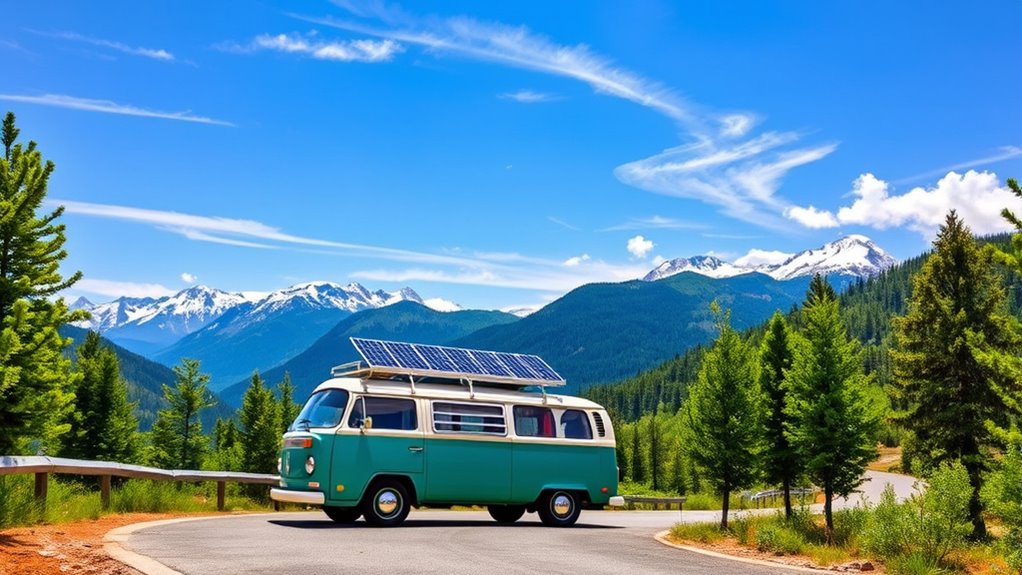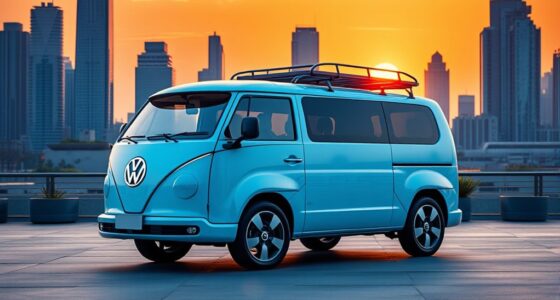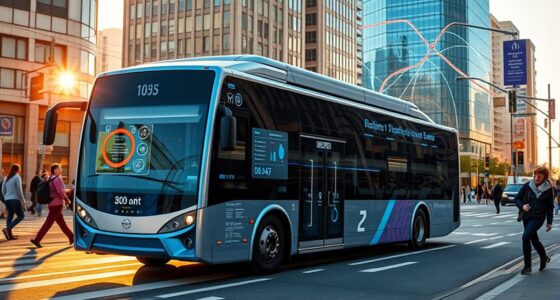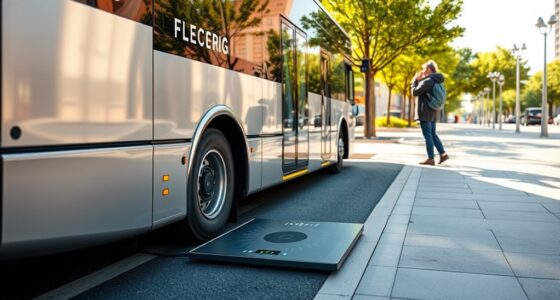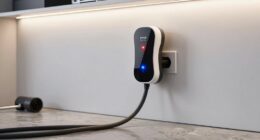Yes, solar panels can make your VW bus truly off-grid by providing clean, renewable energy for extended trips in remote areas. With lightweight, flexible panels installed on your roof, you can generate power to charge batteries, run small appliances, and keep devices running without relying on hookups or noisy generators. Advanced systems are user-friendly and expandable, ensuring you stay self-sufficient. Keep exploring to discover how to optimize your solar setup and enjoy uninterrupted adventures.
Key Takeaways
- Solar panels provide renewable energy, enabling your VW bus to operate independently of external power sources.
- Properly sized and installed solar systems can power essential devices, making your bus truly off-grid.
- Battery storage allows energy reserve use during cloudy days or nighttime, ensuring continuous off-grid functionality.
- Lightweight, flexible panels are ideal for RVs, offering easy expansion and reliable off-grid power.
- Solar power reduces reliance on noisy generators, enhancing eco-friendliness and peace during remote road trips.

Imagine hitting the open road confident that your journey is powered by clean, renewable energy. You’ve got your VW bus ready, packed with your favorite camping gear, and a sense of freedom that only a true off-grid adventure can bring. The question is, can solar panels keep you truly off-grid, giving you the power you need without relying on hookups? The answer’s increasingly yes, thanks to advances in solar energy technology. Installing solar panels on your VW bus transforms it into a mobile, eco-friendly haven where you can camp in remote spots without sacrificing modern comforts. You can generate your own electricity, charge devices, run small appliances, and even keep your batteries topped up for extended stays in nature.
Power your VW bus with solar energy for off-grid adventures and eco-friendly freedom.
The key lies in choosing the right solar energy system for your needs. Flexible, lightweight solar panels are ideal for RVs and camper vans because they adapt to curved surfaces and don’t add much weight. You can mount them on the roof of your VW bus, ensuring maximum sun exposure during the day. The energy generated is stored in a deep-cycle battery bank, which acts as your power reservoir. With this setup, you’re free to use your camping gear—like portable fridge units, LED lighting, or even small fans—without the noise or fumes of traditional generator power.
A major benefit of solar energy is its reliability and sustainability. When the sun’s shining, you can quietly produce enough power for everyday needs. During cloudy days or at night, your stored energy keeps you running smoothly. Plus, modern portable solar panels and folding kits make it easy to add extra capacity if you want more power for extended off-grid adventures. You don’t need to be a tech expert to set up a basic system; many kits come with clear instructions, and there’s plenty of online guidance.
The integration of solar panels with your camping gear doesn’t just add convenience; it enhances your entire experience. No more searching for campgrounds with hookups or lugging around noisy gas generators. Instead, you enjoy peace, quiet, and a smaller carbon footprint. Your VW bus becomes a self-sufficient, eco-conscious home on wheels, allowing you to explore remote wilderness areas while staying connected to the essentials. With a little planning and the right gear, solar-powered road trips are no longer just a dream—they’re a practical, sustainable way to embrace the open road on your terms.
Frequently Asked Questions
How Long Do Solar Panels Typically Last on a VW Bus?
Solar panels on your VW bus typically last around 25 to 30 years, thanks to their durability. You should check the panel durability and warranty coverage, as most reputable brands offer warranties of 10 to 25 years. Proper maintenance, like keeping panels clean and avoiding damage, can extend their lifespan. With good care and warranty support, your solar setup can power your adventures for many years to come.
Can Solar Panels Fully Power All RV Appliances?
Think of solar panels as your RV’s heartbeat; they can power many appliances, but not everything at once. Their efficiency varies, so you might need extra batteries or a generator for heavy-duty devices. With good RV power management, solar energy can handle lighting, small appliances, and charging gadgets, but for high-demand items, you’ll want backup options. It’s about balancing your energy needs and making the most of your solar setup.
What Maintenance Is Required for Solar Panels During Road Trips?
During your road trips, you should regularly check your solar panels for dirt and debris, so solar panel cleaning keeps them performing efficiently. Also, monitor your battery maintenance, ensuring your batteries stay charged and in good condition. Keep an eye on wiring connections and use a multimeter to check voltage, preventing issues that could reduce power. Proper maintenance helps your solar system stay reliable and maximizes energy during your off-grid adventures.
Are Solar Panels Effective in Cloudy or Rainy Weather?
Think of solar panels as weather-sensitive dancers—graceful in sunlight, hesitant in clouds. In cloudy or rainy weather, their solar efficiency drops, meaning they produce less power. Weather impact is significant, but modern panels still generate some energy through diffused sunlight. While not as effective as on sunny days, they keep your system running, making your off-grid adventures more reliable—even when the skies aren’t clear.
How Much Does Installing Solar Panels on a VW Bus Cost?
You’re wondering about the solar panel pricing and installation costs for your VW bus. Typically, the cost varies depending on panel size and quality, ranging from $1,500 to $4,000. Installation costs can add another $500 to $2,000, especially if you hire a professional. Keep in mind, investing in solar panels can save you money long-term by reducing your reliance on external power sources during your adventures.
Conclusion
So, as you hit the open road with solar panels powering your VW bus, you’re truly embracing the spirit of adventure. While the technology isn’t perfect, it’s a step toward more self-sufficient travels, letting you go further without a hitch. Just remember, no plan is foolproof, and sometimes you’ll need to roll with the punches. With solar energy, you’re carving out your own path—making the most of the journey and the destination alike.
